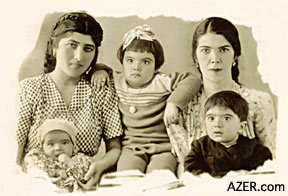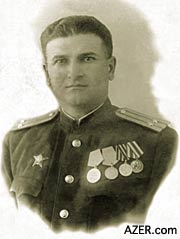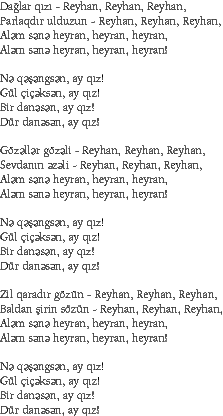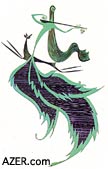|

Spring 2005 (13.1)
Pages
78-79
What's in a Name?
Reyhan - That Girl, That Song
by Reyhan
Reynaldi
  Folklorists
claim that names are the DNA of a society, encapsulating the
dreams and hopes of parents for their children. One tiny strand
of letters carries an incredible amount of vital information
in terms of a person's social heredity. From a single word, it
is often possible to determine a person's gender, educational
level, social and economic status, language and religious preferences,
sense of aesthetics, political inclinations, nationality, age,
and, sometimes, even birth sequence. Folklorists
claim that names are the DNA of a society, encapsulating the
dreams and hopes of parents for their children. One tiny strand
of letters carries an incredible amount of vital information
in terms of a person's social heredity. From a single word, it
is often possible to determine a person's gender, educational
level, social and economic status, language and religious preferences,
sense of aesthetics, political inclinations, nationality, age,
and, sometimes, even birth sequence.
Those things ring true when it comes to the Azerbaijani girl's
name "Reyhan" that became popularized by the song -
"Daghlar Gizi Reyhan" (Mountain Girl Reyhan). Actually,
this song was written about a little girl whose father took it
upon himself to change his daughter's name to "Reyhan"
against the will of her mother. I know because that little girl
was me!
I was born in 1951. Not long afterwards, my father, Oruj Goshgarli,
had my name officially changed to Reyhan. It was a decision he
made entirely on his own. He didn't consult with my mother at
all about it. As you can imagine, she and her relatives were
extremely upset since they were the ones who had originally chosen
the name "Durdana" for me.
  Left: Reyhan's family. Left to right: Aunt
Solmaz holding Reyhan, sister Tarana, mother Boyukhanim holding
brother Goshgar. Baku 1952. Left: Reyhan's family. Left to right: Aunt
Solmaz holding Reyhan, sister Tarana, mother Boyukhanim holding
brother Goshgar. Baku 1952.
Perhaps, it
was to be expected that my father, a retired military commander,
would do such a thing. He had served with the Taganrog Division
(1939-1945) in World War II and was used to giving orders.
My mother had grown up in a middle class family in Baku. Her
grandfather had owned a few oil wells in the Balakhani region
on the Absheron Peninsula near Baku in the late 1890s. Her father
was a well-known merchant. He owned a General Store, which sold
china, paint and domestic merchandise. He often traveled to the
Middle East and Europe, and while he was not formally well educated,
he was known for his "street smarts" when it came to
trade.
Although my father had held a high military position in the war,
when he returned to Baku, they made him a regional military inspector.
He was also teaching in the military program at Azerbaijan's
Polytechnic Institute. Most of all, he was not happy with his
new military assignment which made him travel a lot from one
district to another, inspecting the local military departments
(voenkomats).
It wasn't long before my father's outspokenness got him expelled
from the Communist Party. That's when he began writing poems,
novels and short stories about Azerbaijani soldiers and their
heroic contributions during World War II.
Back in Baku after the war, my father fell in love with my mother,
a young dentist named Boyukhanim, known among her friends as
Bela. By the following year - 1947 - they were married. Their
wedding ceremony was attended by many intellectuals, including
famous Azerbaijani poets, writers and artists, such as Samad
Vurghun, Suleyman Rustam and Talat Eyyubov.
They had four children; I was the third. My mom's side of the
family had chosen the name "Durdana" for me because
it rhymed with my sister's name "Tarana". It was fashionable
those days to give similar sounding names to siblings. My mom
was a strong advocate of Baku culture and tradition, while my
father's atheistic and rebellious spirit reflected traditions
from Ganja, a city in north central Azerbaijan.
Name Change
  Left: Reyhan's father Oruj Goshgarli, a military
officer, who liked the name "Reyhan" and changed his
daughter's name from Durdana to Reyhan. Baku, 1946. Left: Reyhan's father Oruj Goshgarli, a military
officer, who liked the name "Reyhan" and changed his
daughter's name from Durdana to Reyhan. Baku, 1946.
But, still,
my father was infatuated with this new name - Reyhan. He thought
it was quite revolutionary and that any female would gain additional
strength and energy from this name. He was sure that such a name
would make any woman proud. Actually, though Reyhan was a new
name in the Azerbaijani treasury of names, it was quite popular
in both Persian and Hebrew. The word Reyhan means basil - that
delicious herb - fresh, aromatic, delicate and lush green.
Middle class life in Baku in the mid-20th century was quite optimistic,
especially after the death of Stalin in 1953. People supported
socialist reforms and were convinced that the economy was developing.
With the help of my mother's father, my parents managed to buy
a large apartment on the third floor in the historical building,
which now houses the Azerbaijani Cinema (close to Fountains Square).
Oil Baron Lalayev had constructed this residence for himself
in 1870.
One of my father's best friends - the famous poet Talat Eyyubov
- spent quite a lot of time with us in our home. Though Talat
mostly fretted over new poems and complained about his lonely
life, my father considered him to be very talented since he had
translated some of Shakespeare's works into Azeri.
The Poem
The unhappiness that my father brought upon my mother by changing
my name began to weigh heavily on him. He wanted to do something
to try to make it up to her, but wasn't quite sure what to do.
How could he approach his young wife and her strongly opinionated
father and her other relatives? He confided in Talat. It wasn't
long before they came up with a plan.
  Left: Durdana Goshgarli at age 2-3 years (1953-54)
around the time when, unknown to her mother, her father officially
changed her name to Reyhan. Left: Durdana Goshgarli at age 2-3 years (1953-54)
around the time when, unknown to her mother, her father officially
changed her name to Reyhan.
A few days later,
my mom was invited into the dining room for a surprise. That's
when Talat recited his poem about a little girl named "Durdana"
who became known as "Reyhan". It described her as beautiful,
charming and unique. It mentioned that she had roots that could
be traced to the mountains. Actually, my father's last name Goshgarli
derives from the Goshgar Mountains, which are located in the
Small Caucasus.
The gesture left a deep impression on my mother. Here was a poem
dedicated to her little girl, written by the famous poet Talat
Eyyubov, who had translated Shakespeare! So it seems, she became
reconciled to the idea.
The Song
"Reyhan" Lyrics by Talan Eyyubov, Music by Fikrat Amirov
|
Mountain girl - Reyhan, Reyhan,
Reyhan,
Your star is shining - Reyhan, Reyhan, Reyhan,
You're amazing, amazing, amazing,
You're amazing, amazing, amazing!
What a beautiful girl!
Like a flower, this girl!
One and only one, this girl!
Like Durdana, this girl.
Most beautiful - Reyhan, Reyhan, Reyhan,
First love - Reyhan, Reyhan, Reyhan,
You're amazing, amazing, amazing,
You're amazing, amazing, amazing!
What a beautiful girl!
Like a flower, this girl!
One and only one, this girl!
Like Durdana, this girl.
Dark eyes - Reyhan, Reyhan,
Reyhan,
Words like honey - Reyhan, Reyhan, Reyhan,
You're amazing, amazing, amazing,
You're amazing, amazing, amazing!
What a beautiful girl!
Like a flower, this girl!
One and only one, this girl!
Like Durdana, this girl.
|
 |
  Left: Illustration (1985) for the song "Reyhan"
by artist El Turan. The concept for his sketch is a play on the
meaning of the word "reyhan" as the herb "basil". Left: Illustration (1985) for the song "Reyhan"
by artist El Turan. The concept for his sketch is a play on the
meaning of the word "reyhan" as the herb "basil".
It wasn't until
later that the famous Azerbaijani composer Fikrat Amirov (1922-1984)
set the poem to music. Zeynab Khanlarova (born 1936) was the
first person to sing it. Later on, Rashid Behbudov (1915-1988)
also performed and recorded it, making it very popular, not only
in Azerbaijan, but throughout Central Asia as well. It also has
become popular in Turkey.
To tell you the truth, I really believe that this song has played
a very important role in shaping my life and inspiring me to
become the person I am today. All my life I have tried to live
up to the image of this girl Reyhan in the song and to make my
parents proud.
And so I became a geologist and went on to earn my doctorate
in Geology. It was this poem and song, which shaped my destiny.
I like to think that I'm really like the Reyhan in the song -
"Like a flower, this girl! - One and only one, this girl!
Reyhan, Reyhan, Reyhan!"
Back to Index AI 13.1 (Spring
2005)
AI Home
| Search | Magazine
Choice
| Topics
| AI Store | Contact us
Other Web sites
created by Azerbaijan International
AZgallery.org | AZERI.org | HAJIBEYOV.com
|






